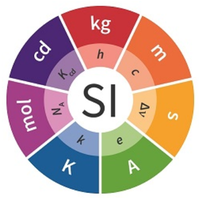Cohen 2008 IUPAC Green Book
| Cohen ER, Cvitas T, Frey JG, Holmström B, Kuchitsu K, Marquardt R, Mills I, Pavese F, Quack M, Stohner J, Strauss HL, Takami M, Thor HL (2008) Quantities, Units and Symbols in Physical Chemistry. IUPAC Green Book 3rd Edition, 2nd Printing, IUPAC & RSC Publishing, Cambridge. |
Cohen ER, Cvitas T, Frey JG, Holmstroem B, Kuchitsu K, Marquardt R, Mills I, Pavese F, Quack M, Stohner J, Strauss HL, Takami M, Thor HL (2008) IUPAC Green Book
Abstract: The purpose of this manual is to improve the exchange of scientific information among the readers in different disciplines and across different nations. As the volume of scientific literature expands, each discipline has a tendency to retreat into its own jargon. This book attempts to provide a readable compilation of widely used terms and symbols from many sources together with brief understandable definitions. IUPAC is the acronym for International Union of Pure and Applied Chemistry.
• Bioblast editor: Gnaiger E
Labels:
Amount of substance, Avogadro constant, Charge number, Concentration, Count, Density, International System of Units, IUPAC, Oxygen solubility, MitoFit 2020.4, BEC 2020.1, BEC 2020.2, X-mass Carol, Molar mass, MitoFit 2021 CoQ
Preprint
in: Anastrophe XX Entity X and elementary unit x of A X-mass Carol
Number and count
- Number and count
- In section 2.9 STATISTICAL THERMODYNAMICS (p. 39), the first entry is 'number of entities' N (SI unit: 1), and the second entry is 'number density of entities, number concentration C = N/V (SI unit: m-3).
- In section 2.10 GENERAL CHEMISTRY (p. 42) again: 'number concentration, number density of entities' CB = NB/V (SI unit: m-3; Notes 2, 12, 14).
- Note (2): The definition applies to entities B which should always be indicated by a subscript or in parentheses, e.g. nB or n(B).
- Note (12): V is the volume of the mixture.
- Note (14): The term number concentration and symbol C is preferred for mixtures.
- Number and count
Comment: Number of entities is not a number, but number of entities is a count. The IUPAC Green Book does not define nor use the term count, whereas the term count for a quantity is used by the SI without proper definition (Bureau International des Poids et Mesures 2019 The International System of Units (SI)). The way count is used in the SI suggestes the definition of count as the number of elementary entities. 'Number concentration' is a misleading term and should be replaced by the proper term 'count concentration'.
Charge of an electron — or per electron
- Section 2.4 QUANTUM MECHANICS AND QUANTUM CHEMISTRY, Note (6): -e is the charge of an electron.
Comment: Elementary charge or proton charge e is the charge per elementary entity H+ with SI unit [C] but canonical SI unit [C·x-1]. When the charge Qel [C] of a number Ne [x] of electrons e is divided by the count Ne, then the particle charge or charge per elementary entity is obtained, -e = Qel/Ne [C·x-1].
Extension to terminology on nonequilibrium thermodynamics
- Gnaiger E (1993) Nonequilibrium thermodynamics of energy transformations. Pure Appl Chem 65:1983-2002. - »Bioblast link«
Keywords—MitoPedia
- Bioblast links: SI base units - >>>>>>> - Click on [Expand] or [Collapse] - >>>>>>>
- Entity, count, and number, and SI base quantities / SI base units
Quantity name Symbol Unit name Symbol Comment elementary UX elementary unit [x] UX, UB; [x] not in SI count NX elementary unit [x] NX, NB; [x] not in SI number N - dimensionless = NX·UX-1 amount of substance nB mole [mol] nX, nB electric current I ampere [A] A = C·s-1 time t second [s] length l meter [m] SI: metre mass m kilogram [kg] thermodynamic temperature T kelvin [K] luminous intensity IV candela [cd]
- Fundamental relationships
- » Avogadro constant NA
- » Boltzmann constant k
- » elementary charge e
- » Faraday constant F
- » gas constant R
- » electrochemical constant f
- Fundamental relationships
- SI and related concepts
- Bioblast links: Concentration and pressure - >>>>>>> - Click on [Expand] or [Collapse] - >>>>>>>
- Concentration
- » Volume
- » Activity
- » Concentration
- » Density
- » Mole
- » Molar mass
- Concentration
- Pressure
- Solubility = concentration/pressure
- General
- » Boltzmann constant
- » Energy
- » Force
- » Gas constant
- » Work
- General
- Related keyword lists
Cited by
- Gnaiger E (2020) Mitochondrial pathways and respiratory control. An introduction to OXPHOS analysis. 5th ed. Bioenerg Commun 2020.2. https://doi.org/10.26124/bec:2020-0002
- Gnaiger E (2020) Canonical reviewer's comments on: Bureau International des Poids et Mesures (2019) The International System of Units (SI) 9th ed. MitoFit Preprint Arch 2020.4 doi:10.26124/mitofit:200004.
- Gnaiger E et al ― MitoEAGLE Task Group (2020) Mitochondrial physiology. Bioenerg Commun 2020.1. doi:10.26124/bec:2020-0001.v1.
- Komlódi T, Cardoso LHD, Doerrier C, Moore AL, Rich PR, Gnaiger E (2021) Coupling and pathway control of coenzyme Q redox state and respiration in isolated mitochondria. Bioenerg Commun 2021.3. https://doi.org/10.26124/bec:2021-0003





